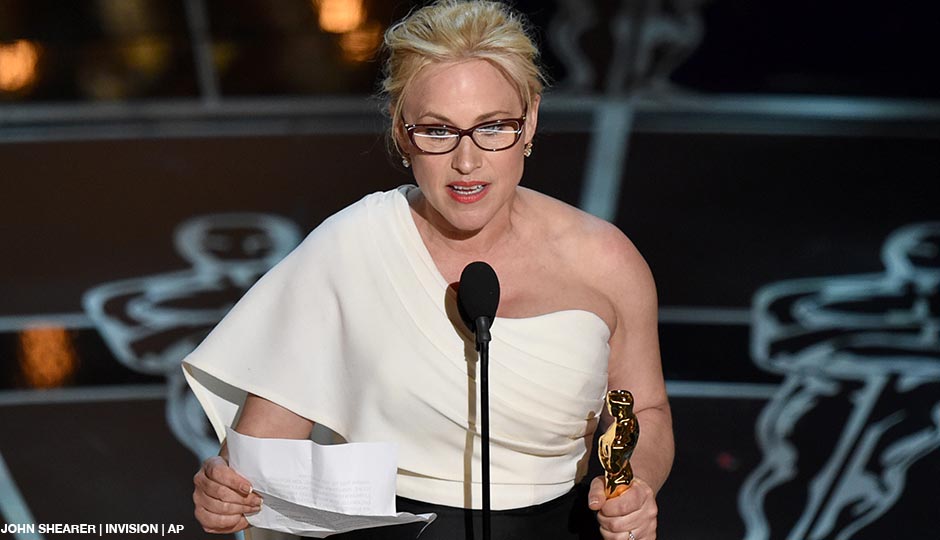Whom Does Patricia Arquette Want Equality For?

Patricia Arquette accepts the award for best actress in a supporting role for Boyhood at the Oscars on Sunday, Feb. 22, 2015, at the Dolby Theatre in Los Angeles.
It was tempting to cheer Patricia Arquette on during her now-infamous Oscar acceptance speech on Sunday night.
“To every woman who gave birth to every taxpayer and citizen of this nation, we have fought for everybody else’s equal rights,” said the actress, who won for her role in Boyhood. “It is our time to have wage equality once and for all and equal rights for women in the United States of America.”
Meryl stood up. JLo stood up. These are women I very much want to stand up with.
But even as it still hung fresh in the air, even before we had time to parse the language, something was strange about that statement. Arquette seemed to leave out an awful lot of women who perhaps need more help asserting their rights than millionaire movie stars.
And if there was any doubt about the inclusivity — or lack thereof — of Arquette’s statement, she sealed the deal backstage.
“It’s time for all the women in America — and all the men that love women and all the gay people and all the people of color that we’ve all fought for — to fight for us now,” she continued during the post-speech press conference.
Many have already pointed out the obvious: These groups are not mutually exclusive; there are, obviously, gay women and women of color.
If you’re being generous, you could attribute this sloppy statement to Arquette being flustered after accepting the industry’s most prestigious award as the world — or at least, the extremely bored part of the world without better Sunday night plans — looked on.
But if you’ve been paying attention to the strange undercurrent of privilege and entitlement in some pockets of the “equality” movement, you’ll probably take her words at face value. Patricia Arquette’s brand of feminism advocates for a very narrow group of women, and even if her intentions were in the neighborhood of good, they’re uncomfortable and unproductive. Like the coded language that lurks through Ferguson discussions, there’s a feminist rhetoric that makes it clear who’s invited to the Girl Power party, who didn’t make the cut and who was never even on the radar.
Arquette took to Twitter yesterday afternoon to clarify her position — which didn’t go terribly well, so she resorted to spouting facts about equal pay and working mothers that are seemingly impossible to disagree with.
Not a bad move, considering that anyone who questions the equal pay narrative will get eaten alive on the Internet a la Stacey Dash, who went on Fox to take issue with Arquette’s statements and brought up the already-existing Equal Pay Act of 1963.
Dash is a little bit right, just like Arquette is a little bit right. Equal pay for equal work is already technically on the books. However, the wage gap is still very real, and there’s still work to be done. But who do we want to do it, and what exactly will we consider equal?
Patricia Arquette and her Oscar cheerleaders seem to think that they are owed something by … who? The LGBT community? The black community? A generic Dr. Evil CEO?
Here’s where – God in heaven and loved ones in hell help me – I’m inclined to hear a Fox & Friends commentator: We as women have rights, lots of rights, and it’s on us to get what we deserve, as well as have reasonable discussions about what that is and why the wage gap exists.
As nice as Arquette’s call to support working mothers sounds, nothing in this equal world is for free. Man or woman, you can’t expect to make boardroom money and make it to soccer games. Man or woman, you can’t be promoted at the same rates when you take family leave. Man or woman, you can’t expect special treatment for a small group while demanding equality because … equality.
If you didn’t get your fill of out-of-touch advocacy and eating-the-cake, pampered-white-girl feminism on Sunday night, you could also check out Reese Witherspoon’s #AskHerMore campaign. Here’s the idea: When actresses step out on the red carpet and rack up freebie gossip column publicity in $15,000 gowns, NASA-developed shapewear and earrings that cost more than a Rittenhouse condo, journalists are expected to ask them about their Very Important Work instead of their outfits.
I’m really into equality. Big fan. Which is why I want it for every single person, regardless of color, gender, sexual orientation or taxpayer status. And why — no Reese, I’m not patronizing you — I’m asking about the damn Spanx.
Follow @IProposeToast on Twitter.


